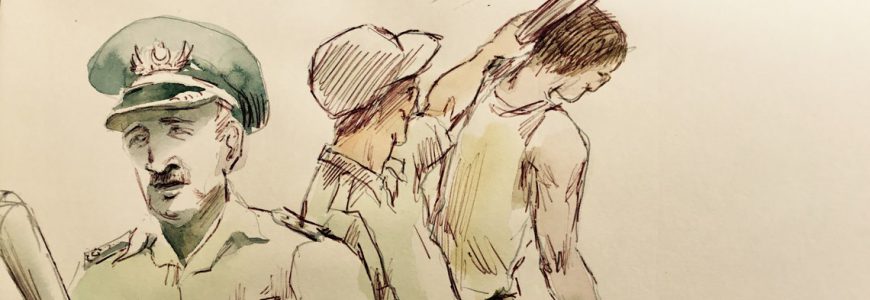Azerbaijani political prisoner Abbas Huseynov has been tortured in a prison (popularly known as the Gobustan prison), in which he is held and which belongs to the Azerbaijani Justice Ministry’s Penitentiary Service. Abbas Huseynov is a deputy to the leader of the Muslim Unity movement, Taleh Baghirzadeh. The torture was carried out by the prison governor, a deputy prison chief and several guards, Huseynov told his defence lawyer Yalchin Imanov. The lawyer told us about what happened in the notorious high-security prison for especially dangerous criminals, which is located 70 kilometres outside Baku.
Abbas Huseynov says that on 20 July, after the Court of Appeals in Baku upheld his sentence (20 years’ imprisonment), he was taken back to the Baku detention centre and immediately placed in the punishment cell for seven days. But two days later, on 22 July, he and Jabbar Jabbarov, another defendant in the so-called Nardaran case, were suddenly taken to the Gobustan prison.
Note: On 26 November 2015, a [security] operation was conducted in the village of Nardaran near Baku to detain Taleh Baghirzadeh, the head of the Muslim Unity movement. There were clashes between police and his supporters in the course of the operation. Six people were killed, including two police officers, and several people were injured. One of those injured went on to die from injuries received. More than 70 people were detained, including the leader of the Muslim Unity movement, Taleh Baghirzadeh.
Azerbaijani authorities accuse the Muslim Unity movement of attempting to change the constitutional system through violence and establish a religious state governed by Sharia law. Taleh Baghirzadeh rejects the charges brought against him.
In January 2017, the Court for Serious Crimes in Baku passed sentences against 17 defendants. It sentenced the leader of the Muslim Unity movement, Taleh Baghirzadeh, and his deputy Abbas Huseynov to 20 years in prison. The others received between 10 and 19 years in prison. These people are charged with terrorism, illegal possession of weapons and failure to obey the lawful demands of a police officer.
This is Gobustan for you
‘On 22 July, after the mid-day prayer, they brought us to Gobustan. They immediately cuffed my hands and Jabbar’s hands behind our backs and dragged us with our faces on the floor. There were me, Jabbar and one more prisoner there. They put us against the wall, with our faces facing the wall, and kept us in this position in the heat. When I started talking about our rights, they responded that it was Gobustan there. Then, a prison officer named Rovshan said, “This one is very talkative; guys, explain things to him.” Later, a sergeant began beating me on my back with a baton. Then, they threw me into the punishment cell.’
Worms crawl out of the toilet
Huseynov was formally meant to be held in the punishment cell until 25 July, but in fact he was held there until 29 July.
‘The punishment cell was horrible, large worms crawled on the floor, they crawled out of the toilet, there was dirt all around, the sheets had turned black with the dirt. I asked the warden to give me a piece of clean paper so I could perform a prayer, but they did not give me even that.’
Huseynov said that Major Namig Guliyev, a prison officer, beat him on 25 July. Guliyev punched him in his stomach and jaw and said that ‘a baton and a prisoner are inseparable friends.’ Huseynov threatened he would complain about those illegal actions. In response, the prison administration put together a statement that accused Huseynov of insulting prison officers.
At the time of writing, Huseynov had spent 17 days in Gobustan prison. During that period, he was reprimanded four times under various pretexts.
They tied me to an iron post
On 26 July, under the pretext of a summons to the prison governor’s office, they took the prisoner out of the punishment cell and tied him to an iron post: ‘They held me tied for about three hours, with my face against the iron post and my hands tied behind my back, in the hottest part of the day. Three hours later they untied me and threw me back into the punishment cell.’ Huseynov demanded that a doctor be called, but he never received medical assistance.
Abbas Huseynov said that he was placed in the punishment cell again on the 29th and that he was told that there were no places in the quarantine (convicts spend their first days there, waiting to be placed in cells – editor’s note).
Taleh Baghirzadeh’s condition worsens
Huseynov says that one more man convicted in the Nardaran case was transferred to the Gobustan prison together with him. That person was theologian Taleh Baghirzadeh. Abbas could hear Taleh’s voice coming from a neighbouring cell. Baghirzadeh’s condition worsened due to the intense heat, and prisoners asked for a doctor to be called. In response, the jailer began to insult Taleh. The prisoners demanded a meeting with the prison governor and threatened to go on a hunger strike. The next day, Taleh was thrown into the punishment cell.
Official bodies not responding
Meydan TV tried to obtain comments from the Azerbaijani Ombudsman and the State Penitentiary Service. The office of the Human Rights Ombudsman said that any complaint they receive is immediately considered (there are no comments regarding Huseynov). The Penitentiary Service refused to answer questions, citing the absence of a public relations representative of this agency.
We should note that according to a list, updated on 1 April 2017 by the Centre for the Protection of Political Prisoners (CPPP), Azerbaijani prisons currently hold 162 political prisoners. The largest group of political prisoners are “religious believers” – activists from the Muslim Unity movement – 103 people.
Meydan.tv

